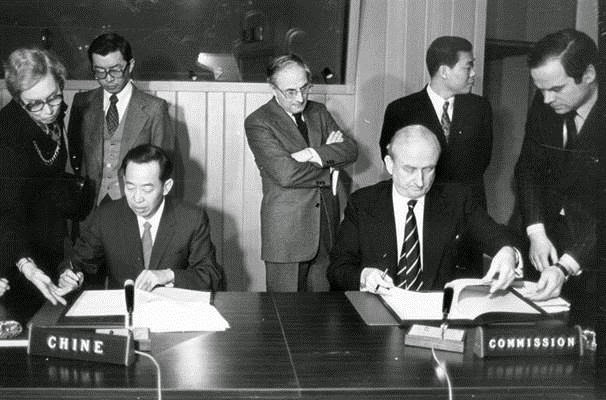The EU is torn between criticising and cheering China
By Ray O'Reilly
At 40, EU-China relations are going through a midlife crisis. Is Europe living up to its human rights values or focusing on the value-added of trade?

Friday 24 April 2015
European Union officials criticised the imprisonment of veteran Chinese journalist Gao Yu, describing it as “blatant political persecution”, reported The Guardian and other newspapers.
Gao was handed down a seven-year prison sentence on 17 April for leaking to a British newspaper ‘Document No 9', which reveals the Communist party's less than glowing view of human rights activities.
After the trial, officials from both the US and EU spoke out about the verdict. Raphael Droszewski from the EU Delegation to China told reporters that the sentence “heightened concerns over the situation of human rights defenders, including lawyers and journalists”. Dan Biers, first secretary at the US embassy, reportedly said rather mutedly that his country was disappointed by the verdict.
The statements were made as observers report a worrying intransigence in China towards the media, and a slew of detentions and convictions of activists, lawyers and journalists, such as the outspoken Gao who has already served jail time for similar “crimes” and her pro-democracy stance following the Tiananmen Square massacre of 1989.
“Gao Yu's sentence is a travesty of justice and yet another affront to free expression in China,” remarked Maya Wang, an Asia researcher at Human Rights Watch. “The heavy sentence… reflects the worsening crackdown on civil society and its defenders since President Xi Jinping came to power. It is yet another unequivocal message to China's remaining activists that the government does not tolerate dissent.”
“The document Gao Yu is accused of leaking can in no reasonable way be classified as a legitimate state secret,” commented William Nee, China researcher at Amnesty International. “To the authorities' immense embarrassment, Gao Yu laid bare the Communist party's outright hostility to human rights, and for that she is being severely punished.”
Hong Lei, China's foreign ministry spokesman, responded to the criticism, saying that Gao's case was handled in line with Chinese law: “Citizens have always enjoyed all forms of rights accorded to them under the constitution… At the same time, citizens must strictly abide by their obligations under the constitution,” he said.
Despite the criticism and concern expressed by officials on both sides of the Atlantic, it has continued to be “business as usual” for both the EU and the United States. This was reflected in the active preparation underway for celebrations marking the 40th anniversary of Euro-Chinese relations.
By unfortunate coincidence, on the same day as the EU was condemning Gao's imprisonment, European diplomatic missions in China announced a string of “open days” to celebrate the four decades of Sino-European relations. The programme includes information sessions, lectures, debates, cultural events as well as fun and games over a three-month period from April to June.
At 40, the EU's relationship with China seems to be going through a midlife crisis. I'll leave it to you to make up your own mind who is telling fibs in this unfortunate state of affairs and whether the EU is living up to its own lofty Charter of Fundamental Rights as it negotiates important trade deals with China in troubled economic times like these.

